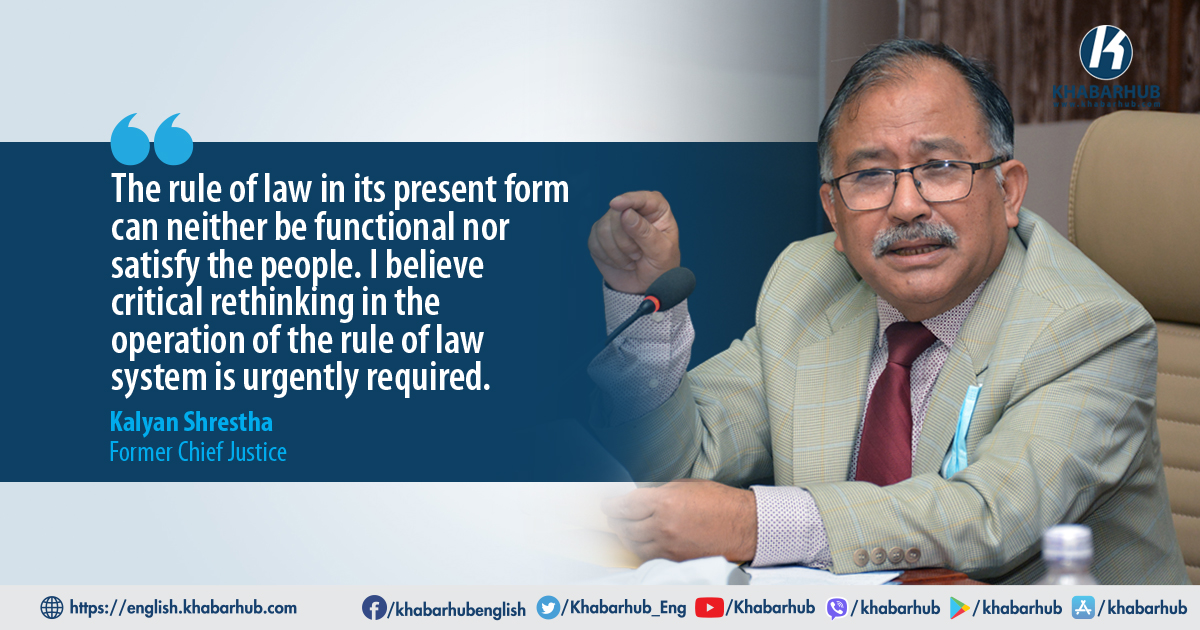I believe the interface between the two issues — human rights and the rule of law — need not be overemphasized. We have been witnessing a declining trend in terms of taking initiatives to minimize human rights risks and strengthen the rule of law system in recent times.
According to the World Justice Project assessment, the global rule of law recession has been ongoing since 2016, and authoritarian trends have been pushing forward since then.
The report indicates that the global downturn has affected 78 percent of countries.
The rule of law, at both the national and international levels, must be effective for human rights to be universally enjoyable; therefore, dialogues between the systems and between nations are always worthwhile.
The rule of law system is considered a mechanism for implementing human rights, and protecting human rights is necessary for democracy to function effectively.
It is understandable that human rights cannot be implemented without a well-functioning rule of law system.
At least a formal structure of progressive human rights law has been established. Legal developments in the field of human rights have remained promising, and judicial contributions in this context have been remarkably appreciable.
I believe each system must be ready to introspect on the reality of rights being exercised and must strive for better realization of those rights.
National systems are increasingly feeling helpless to enforce their laws these days. Information is intercepted from across borders, perpetrators manage to flee national jurisdiction, and crimes are committed from outside national jurisdictions.
The capacity of national legal systems must be enhanced to combat crime internally and externally with technological aids and institutional arrangements.
Money laundering, digital fraud, torture, conflict-related crimes, human trafficking, organ trafficking, theft of cultural items, environmental crimes, and problems exacerbated by climate change are posing serious challenges to the functioning of national rule of law systems.
A well-functioning international legal cooperation regime needs to be designed and executed to address the issues mentioned above.
Now I would like to provide an account of Nepal’s human rights commitments. Nepal has been a party to all core human rights instruments and has ratified most international human rights treaties.
Regarding the domestic implementation of human rights conventions, treaty law gives primacy to treaty provisions in cases of conflict between international human rights instruments and municipal law provisions.
The Nepali judiciary has extensively referred to the provisions of human rights instruments and comparative human rights jurisprudence to interpret national laws.
These have served as a source of law for the Nepali courts. The extensive use of international human rights jurisprudence by national courts has been beneficial for the progressive development of national human rights jurisprudence.
This liberal trend is unique and exemplary for South Asia and many developing countries.
Nepal has declared 31 rights as fundamental rights through the constitution, including civil, political, economic, social, cultural, environmental, and developmental rights.
Enlisting such a wide range of human rights as fundamental rights, along with remedial rights, is a significant leap forward in the realm of rights.
These rights are greatly influenced by international human rights instruments. Such a welcoming attitude towards the international human rights jurisprudence of the constitution and the judicial institutions should be appreciated.
Nepal’s commitment to be bound by international human rights conventions is commendable and inspiring.
One can easily sense the miserable compulsions of a poor or developing country suffering the effects of climate change exacerbated by the actions of mostly developed countries.
At least a formal structure of progressive human rights law has been established. Legal developments in the field of human rights have remained promising, and judicial contributions in this context have been remarkably appreciable.
Many areas of jurisprudence, especially human rights, equality, gender, environment, transitional justice, and reproductive rights, have been taking credible root in recent years.
A new remedial jurisprudence has emerged with judicial activism to broaden the spectrum of access to justice.
The constitution envisions the provision of extraordinary constitutional jurisdiction for the protection of fundamental rights.
Additionally, the Supreme Court has occasionally issued directives in the name of the government to enact particular laws to fill legal vacuums that hinder the enjoyment of constitutional rights.
The constitutional provision for public interest litigation, which liberalizes the concept of locus standi, can be viewed as an innovative step for the expansion of remedial rights.
Nepal has emphasized the need for modernizing laws informed by human rights imperatives and the mandates of the constitution.
New penal and civil codes, as well as procedural codes, have been issued that reflect human rights approaches to criminal law and modern notions of criminal law reforms.
Many new laws have been enacted by parliament to give effect to fundamental rights as required by the constitution.
The constitution has established a strong judicial structure, creating various levels of courts with different jurisdictions.
People are entitled to the right to remedy in cases of rights violations and can approach the appropriate jurisdiction for justice. This is how the Nepali rule of law system is structured.
The rule of law system does not survive merely in the formal proclamation of laws and institutional structures to enforce them; rather, it practically exists in the enjoyment of rights by the people and the institutional capacities of justice institutions to meet the needs of the populace.
With relatively better formal structures of law and legal institutions, and candid commitments to the values of human rights, Nepal has attained the 71st rank according to the ratings of the World Justice Forum project, which is relatively better in the South Asian context.
However, that does not necessarily reflect the level of satisfaction among the people.
Wars, conflicts, trade issues, cyber crimes, international surveillance over freedom of expression at the national level, violations of privacy and other rights across borders, the transnational nature of human trafficking, organ trafficking, torture, money laundering, and organized crimes are not limited to country-specific situations.
Rather, perpetrators commit crimes from beyond borders, and victims suffer injuries caused by the actions of individuals outside national jurisdictions.
Technological developments have strained and challenged the capacity of national legal systems.
Nowadays, no national system can claim to be self-sufficient in defending its laws and systems without the support and cooperation of others.
This limitation is acutely felt by the least developed or developing legal systems, and this is true of Nepal as well.
I believe the helplessness of any legal system can lead to complicity in threats to international peace, security, and justice, and that must be reversed.
I believe climate change and climate justice should be everyone’s concern.
This interface between law, economics, and development must be properly designed, harmonized, and implemented to create a conducive environment for development.
One can easily sense the miserable compulsions of a poor or developing country suffering the effects of climate change exacerbated by the actions of mostly developed countries.
The effects of climate change triggered by the activities of one or more countries will be experienced by others, but without remedies.
This constitutes a clear case of climate injustice. This is an unprecedented challenge faced by humankind in fixing accountability for the causation of wrongs.
As a result of such wrongs, climate conditions within states may change, affecting water resources and biodiversity patterns, thereby impacting the livelihoods and sustainable practices of the people.
This may lead to multidimensional and multilayered effects that compromise the quality of life for individuals and the destiny of nations.
This is the biggest challenge related to human rights and the rule of law system.
Let us explore the role of justice institutions in contributing to the maintenance of climate justice, which, to my mind, has been largely ignored so far. A new consensus may be forged in this direction.
Those who have been paying the price for the wrongs done by others, and for no fault of their own, must be compensated through a dedicated mechanism.
Cyber crimes perpetrated from outside and international surveillance over the innocent enjoyment of freedom of expression, which affects the privacy of individuals, have become serious concerns in the present time.
Capital flight from national jurisdictions to other countries through money laundering or other means poses a serious threat to the national economy.
Recovery of such resources is a valid contention for any affected country, but an easy solution does not seem to be emerging.
Many other issues, such as trafficking in persons for prostitution or human organs, cross-border frauds, and trade barriers, may violate national laws while escaping criminal jurisdictions.
The existing rule of law institutions have not been able to combat such problems.
This necessitates new vistas in forging cooperative arrangements between countries and international systems.
We face numerous challenges in institutionalizing the rule of law itself.
While the constitution has provided liberal space for economic, social, and cultural rights, it requires a substantial commitment in terms of preparing resources, institutions, processes, plans, delivery mechanisms, access, and capacities.
However, not much has been done in this regard. These rights cannot be implemented and enjoyed for free.
Thus far, these rights exist only theoretically; the danger is that they may be reduced from fundamental rights to mere manifesto rights if left unaddressed.
The government appears totally unprepared to take the necessary actions in this regard.
It is facing serious economic problems and is heavily dependent on borrowing to meet even regular expenditures.
Several pretentious attempts were made in the past by the state to avoid initiating the transitional justice process by failing to provide even a basic and acceptable legal framework.
The state needs to bolster economic activities to address its infrastructural needs.
Rights and development are intrinsically related. For the enjoyment of rights, infrastructure must be created.
The linkage between law and development is fundamental for them to be mutually reinforcing and interdependent.
Without expanding the development pie, benefits cannot be shared significantly and equitably among stakeholders.
The law should play a development-friendly role to meet developmental needs.
This interface between law, economics, and development must be properly designed, harmonized, and implemented to create a conducive environment for development.
Another serious problem encountered by the rule of law system in Nepal is impunity.
Otherwise known as a peaceful country, Nepal experienced a decade-long conflict that undermined the entire foundation of peaceful coexistence in society.
Thousands of people were killed, abducted, displaced, and tortured; their property was either destroyed or seized and forfeited, causing significant losses to the victims.
Although combatants quickly joined the government after the conclusion of the peace agreement, the fate of the conflict victims has remained neglected to this day, even after almost two decades since the peace agreement was concluded. Despite repeated interventions from the court to expedite the transitional justice process with appropriate laws, the transitional justice process has not gained the necessary momentum.
The rule of law system is about nurturing good governance, creating a conducive environment for development, protecting rights, and regulating civilized behavior in society.
It has, in fact, been a conspiracy of silence against the conflict victims. The state has not generated the political will to pursue a satisfactory resolution that is beneficial for all, particularly the victims.
Several pretentious attempts were made in the past by the state to avoid initiating the transitional justice process by failing to provide even a basic and acceptable legal framework.
The transitional justice process has been characterized by a game of hide and seek on the part of major stakeholders.
Recently, a new legal framework has been passed by parliament, which may be questionable on some counts when viewed from a justice perspective.
Much depends on the sincerity of the major parties to the conflict to steer the transitional justice process toward a logical conclusion.
We can only remain optimistic amidst outstanding challenges and uncertainties.
In this context, the international community could have done more to promote an expedient justice process at the national level with goodwill gestures, which I believe have not been as visible as expected.
Human rights are important for both national and international rule of law systems, and I believe the international community cannot shy away under any pretext from cooperating with the application of human rights standards at the national level.
Otherwise, impunity and noncompliance with human rights obligations will tend to increase.
The operation of the rule of law system elsewhere is not without problems.
Lack of public participation in lawmaking, political instability, challenges associated with the promulgation of robust laws, inadequate dissemination of laws among the people, lack of capacity among individuals to assert their rights, and the absence of comprehensive programs to broaden access to a justice system that is acceptable, accessible, affordable, trustworthy, and prompt all contribute to making the legal system less functional.
More problems lie with the justice providers. Justice institutions may not be properly organized; they generally grapple with resource issues.
Capacity-building efforts may be neglected, ethical standards may be questioned, public trust may be undermined, and accountability issues may be significantly raised.
Inordinate delays in the expeditious delivery of justice, along with the lack of prompt handling of constitutional disputes, can shake public confidence in the entire legal and political system.
The rule of law and justice institutions cannot function effectively in such situations.
To collaborate in protecting the human and fundamental rights of the people and to complement development initiatives, conserve the environment, and instill a sense of security and justice among the populace, a new and just legal order must emerge.
A comprehensive rule of law system development plan must be established to effectively protect the human rights of the people and ensure good governance.
The rule of law system is about nurturing good governance, creating a conducive environment for development, protecting rights, and regulating civilized behavior in society.
Any system suffers from some of the problems mentioned above.
In our context, executive high-handedness in the resourcing and management of the judiciary, attempts at politicization in the appointment of judges, non-implementation of judgments, inadequate and outdated laws, and all contribute to deficiencies in the operation of the rule of law in Nepal.
Similarly, others include improper conditions of service affecting working and retired judges, unwarranted media trials, complaints of corruption, improper appointment mechanisms, and complicated structures for handling constitutional justice issues within the judicial framework.
To collaborate in protecting the human and fundamental rights of the people and to complement development initiatives, conserve the environment, and instill a sense of security and justice among the populace, a new and just legal order must emerge.
The rule of law in its present form can neither be functional nor satisfy the people. I believe critical rethinking in the operation of the rule of law system is urgently required.
A review of the constitutional structure itself from this perspective may be suggested. The national rule of law system must be capable of protecting human rights.









Comment